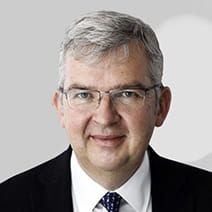- Ongoing market volatility vindicates decision to reduce overall risk score in funds and portfolios
- Central banks continue to raise rates; BoE takes emergency action
- Challenging times require a long-term view
Financial markets delivered more volatility in September, extending the general weakness seen year to date. This ongoing volatility in financial markets has vindicated our decision to reduce the overall risk score in our funds and portfolios to three in Q2 this year. Navigating higher inflation and slowing growth calls for more defensive positioning. Our ratings for equities fell from four to three in our Q3 tactical asset allocation adjustments to reflect the greater uncertainties around interest rate policies and economic growth. We have moved the risk score down for both European equities and European small caps from three to two, given that Europe is the region most at risk from a protracted conflict in Ukraine and the resulting energy crisis.
In terms of fixed income, we have reduced our rating for index-linked bonds from three to two – it is best to buy inflation protection when the risk is underappreciated, unlike now. We have, however, raised our rating on global government bonds from two to three because there are benefits now in diversifying beyond the UK and yields have risen to more attractive levels.
However, we stress the importance of adopting a long-term view to investing in what are very challenging times. The best antidote to market volatility is to spread the risks across a broadly diversified investment portfolio that can reap rewards from multiple sources and will avoid knee-jerk responses to news and market events.
Several major central banks continued to hike rates in September, the strengthening US dollar caused problems for the rest of the world and the Bank of England (BoE) took emergency action, deploying a £65 billion bond-buying programme to support the gilts market after a fiscally loose mini Budget announced by the new Conservative government under Prime Minister Truss undermined the UK’s reputation for financial stability. President Putin caused even more jitters by announcing a partial mobilisation of army reserves for the war in Ukraine, which spurred the greenback to a 20-year high as international investors sought the safe haven of the US.
The Federal Reserve raised interest rates by another 75 basis points for the third time in a row, putting the federal funds rate into a range of 3.00-3.25% and adding pressure on US equities and bonds. Chairman Jay Powell underlined the Fed’s commitment to tackling inflation, warning that interest rates would be maintained at a level to restrain economic growth ‘for some time’ and that this would hurt growth and employment levels. New data had shown that US consumer inflation in August was 8.3%, down from 8.5% in July but higher than the 8.1% that was widely expected.
The BoE delayed its own interest rate announcement because of Queen Elizabeth’s passing but the decision for a 50bp hike to 2.25% (the highest rate since 2008) was widely expected and matched the 50bp hike in August, which had been the sharpest increase in 27 years. Although inflation dropped slightly in August to 9.9%, it was still the highest of the G7 countries and the BoE had to restore some credibility. The new government’s mini Budget was badly received by international investors. Gilts sold off sharply, sterling fell to a 37-year low versus the dollar and the FTSE 100 tumbled on investor worries that Chancellor Kwasi Kwarteng’s tax cuts and energy subsidies would put the UK on an unstable trajectory and likely force the BoE to raise rates even more aggressively.
Across the Channel, there were political upsets in Europe with far-right parties excelling in general elections. The anti-immigration Sweden Democrats won the second highest number of parliamentary seats, while in Italy, a coalition led by the radical right-wing Giorgia Meloni’s Brothers of Italy won an absolute parliamentary majority. In Frankfurt, the European Central Bank (ECB) voted unanimously to raise interest rates from zero to 0.75%, its highest level since 2011, after data showed that the annual inflation rate surged to 9.1% in August. Christine Lagarde, the ECB’s president, promised more rate hikes to come, but probably less than five. The ECB has lagged behind most major central banks in hiking rates to tackle inflation. It does not expect a recession in the Eurozone and raised its expectation of economic growth to 3.1% for this year but did cut its expectations for next year to 0.9% and 2024 to 1.9%. These predictions contrasted with those of several think-tanks that warned the soaring energy prices would cause economic decline in Germany in 2023. The ECB will begin negotiations in October to start reducing its EUR 5 trillion bond portfolio amassed over the last seven years on its balance sheet, which would likely increase borrowing costs, putting additional pressure on the budgets of southern European member countries.
In contrast to its counterparts, the Bank of Japan (BoJ) has resisted raising interest rates this year. The yen fell by around a fifth to a 24-year low of around 145 to the dollar this year on continued loose monetary policy but this reached a point at which the resulting inflation from the high cost of imports was proving unpopular in the country. Consequently, the BoJ intervened in markets for the first time since the late 1990s to defend the yen after the Fed’s rate hike.
In China, some of the biggest state-run banks cut their deposit rates for the first time since 2015, supporting government attempts to boost flagging economic growth without undermining the renminbi. It meant more monetary support could be given to the economy without cutting the official benchmark loan prime rate, which would undermine the currency. China is struggling to contain the consequences of its Covid lockdowns and the growing liquidity crisis in its property sector. Economists have been revising down their forecasts for China’s economic growth, with the government’s target of 5.5% looking increasingly optimistic, even though it is the lowest target in decades. On 16 October, the 20th National Congress of the Chinese Communist Party starts and is widely expected to re-elect Xi Jinping as party leader.
KEY RISKS
Past performance is not a guide to future performance. The value of an investment and the income generated from it can fall as well as rise and is not guaranteed. You may get back less than you originally invested.
The issue of units/shares in Liontrust Funds may be subject to an initial charge, which will have an impact on the realisable value of the investment, particularly in the short term. Investments should always be considered as long term.
Some of the Funds and Model Portfolios managed by the Multi-Asset Team have exposure to foreign currencies and may be subject to fluctuations in value due to movements in exchange rates. The majority of the Funds and Model Portfolios invest in Fixed Income securities indirectly through collective investment schemes. The value of fixed income securities will fall if the issuer is unable to repay its debt or has its credit rating reduced. Generally, the higher the perceived credit risk of the issuer, the higher the rate of interest. Bond markets may be subject to reduced liquidity. Some Funds may have exposure to property via collective investment schemes. Property funds may be more difficult to value objectively so may be incorrectly priced, and may at times be harder to sell. This could lead to reduced liquidity in the Fund. Some Funds and Model Portfolios also invest in non-mainstream (alternative) assets indirectly through collective investment schemes. During periods of stressed market conditions non-mainstream (alternative) assets may be difficult to sell at a fair price, which may cause prices to fluctuate more sharply.
DISCLAIMER
This is a marketing communication. Before making an investment, you should read the relevant Prospectus and the Key Investor Information Document (KIID), which provide full product details including investment charges and risks. These documents can be obtained, free of charge, from www.liontrust.co.uk or direct from Liontrust. Always research your own investments. If you are not a professional investor please consult a regulated financial adviser regarding the suitability of such an investment for you and your personal circumstances.
This should not be construed as advice for investment in any product or security mentioned, an offer to buy or sell units/shares of Funds mentioned, or a solicitation to purchase securities in any company or investment product. Examples of stocks are provided for general information only to demonstrate our investment philosophy. The investment being promoted is for units in a fund, not directly in the underlying assets. It contains information and analysis that is believed to be accurate at the time of publication, but is subject to change without notice. Whilst care has been taken in compiling the content of this document, no representation or warranty, express or implied, is made by Liontrust as to its accuracy or completeness, including for external sources (which may have been used) which have not been verified. It should not be copied, forwarded, reproduced, divulged or otherwise distributed in any form whether by way of fax, email, oral or otherwise, in whole or in part without the express and prior written consent of Liontrust.








